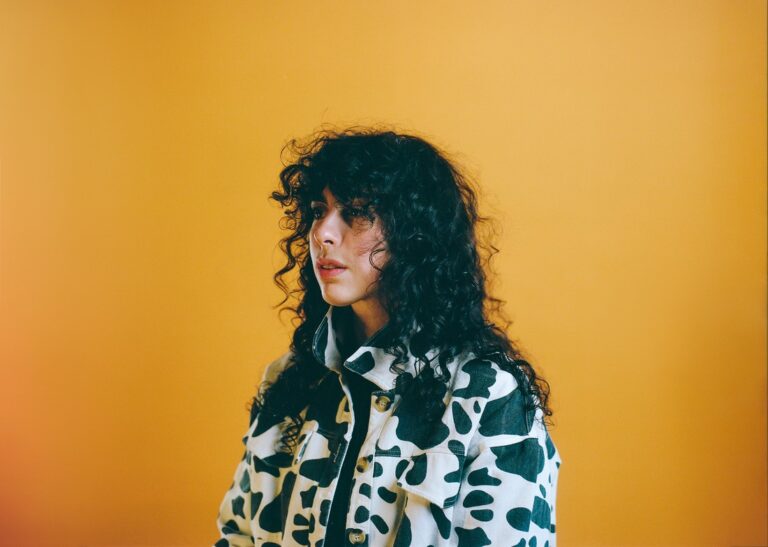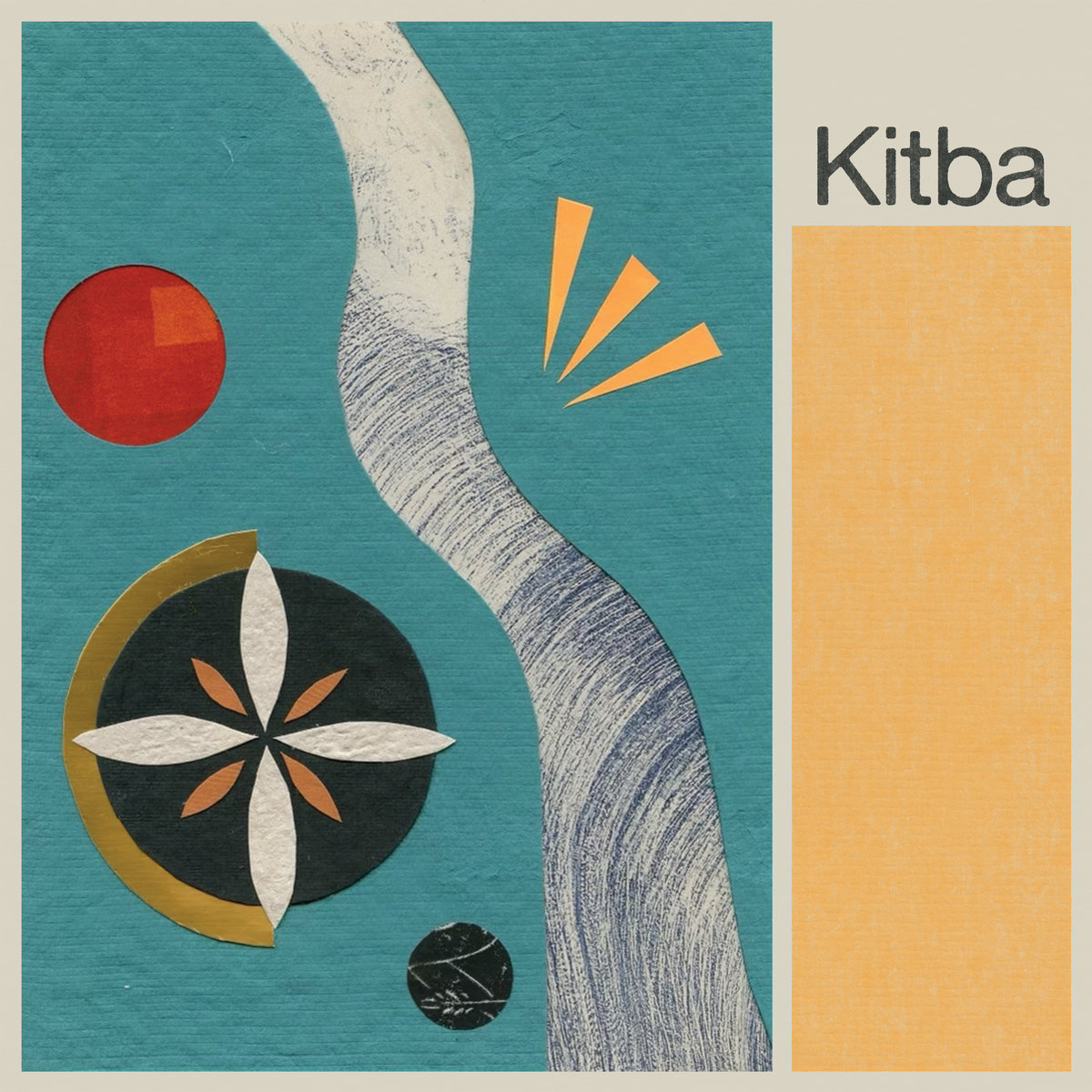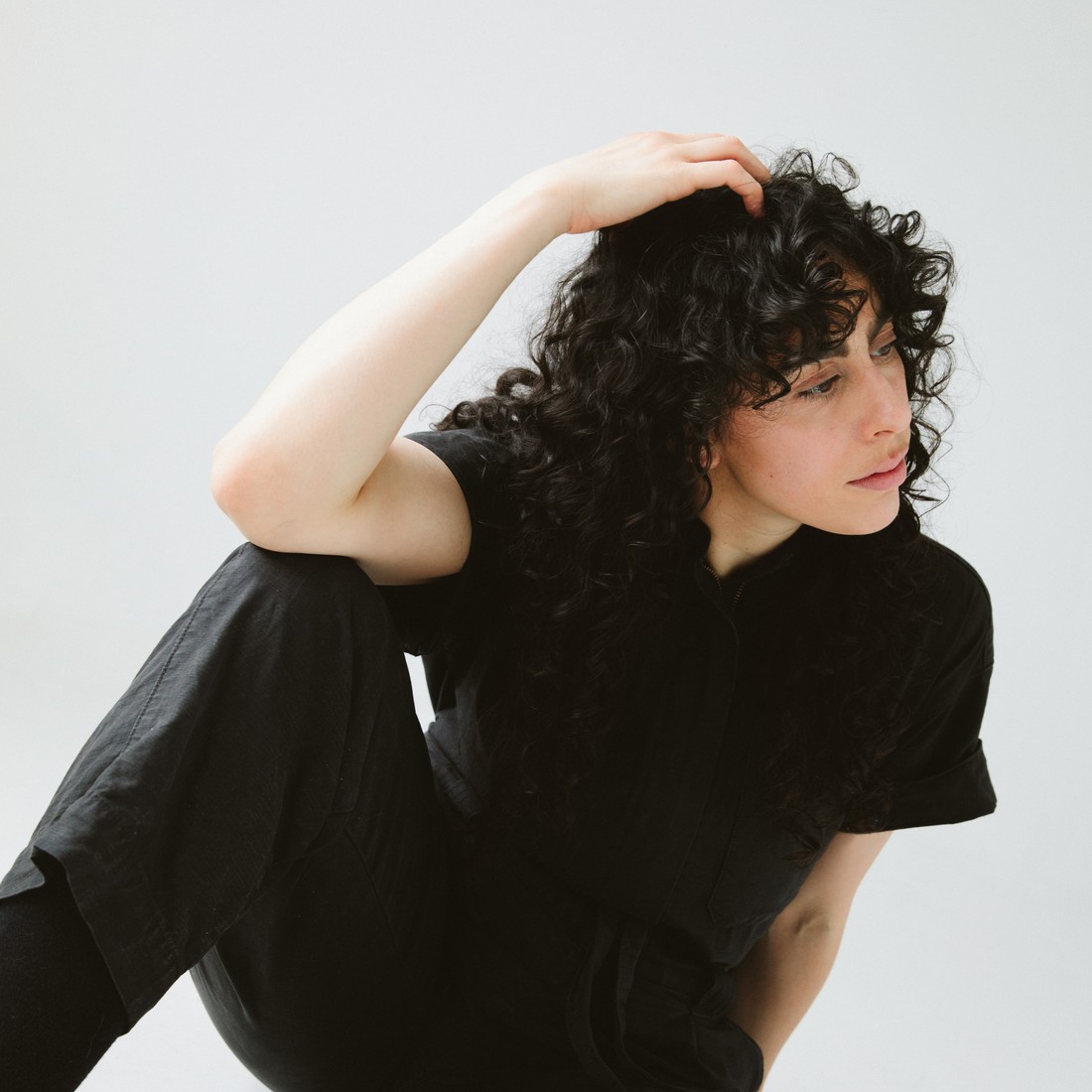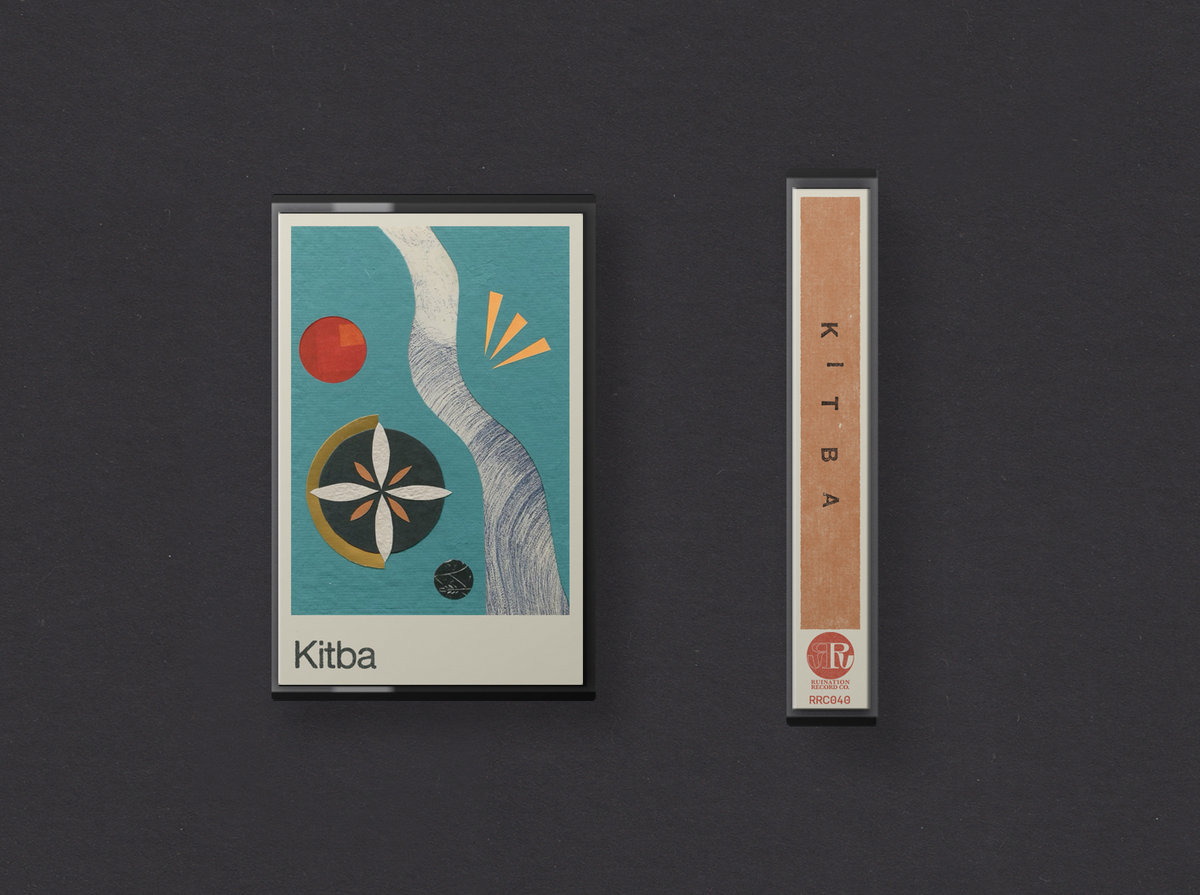“This is not all I am / But all that I am never was / Never has been more than this.” So opens the self-titled debut full-length from Kitba on Ruination Record Co., lines which come to represent a distillation of the songs’ themes and intentions. Because Kitba is a personal album, one in which Rebecca Kitba Bryson El-Saleh throws themselves into the deep end of their own interior without having necessarily learnt to swim. The uncertainty of the opening lines is less a lack of conviction as an acknowledgement of the work’s instinctive mode. A decision to not so much answer any pressing question but instead immersive oneself within the knots and nuances of being alive. This is not all that I am, because I am always learning and changing. But being open to exploring such complex things, I have never been more than this.
The compositions which bring this to life are every bit as detailed and intuitive as this suggests, Kitba’s vocals simultaneously intimate and haunting alongside the sound of their renowned harp work. Songs like ‘Peel Away the Rind’ and ‘Tied By Strings’ are at once welcoming and disquieted, full of tender compassion and simmering unease. It’s as though the listener has been invited into Kitba’s search in real-time, left to drift without the strictures or comfort of prior expectations. Other musicians lend their talents to further this sound, with Zubin Hensler (flugelhorn, drumset, drum programming, synths, guitar, piano), Gregg Belisle-Chi (electric guitar) Ryan Weiner (electric guitar, electric bass) Carmen Rothwell (upright bass), Jason Burger (drumset, percussion) and Joanna Schubert (additional vocals) all working to accentuate the songs’ richness and ultimately give the album a distinctively communal feel.
For what is an inherently personal record, this sense of community is central to Kitba. A symbol of openness which mirrors the album’s underlying processes. A receptivity to change and new directions, a willingness to become something otherwise unexpected. What emerges is proof that art can offer a picture of identity more nuanced than simple labels. A deeper understanding reached via an embrace of confusion. Identity as an ongoing thing.
What took the opportunity to chat with Kitba about the record, touching on everything from their creative process and influences to the joys of local music scenes and deep dives into Twin Peaks.
Congratulations on the release of Kitba. It seems especially fitting for the record to be self-titled, as it offers such an intimate examination of your relationship with yourself. Did you initially set out with this idea in mind, or find yourself drawn to such themes in the process of writing and recording?
Thank you! I actually initially set out to write a record about nightmares. I had this whole concept that I was going to write songs about these vicious nightmares I was having and it would help cleanse them from my system. It worked a little too well—the second I started writing, they disappeared. I tried to continue with the concept but was having difficulty, so I decided to arrange a song-a-day week with friends to sort of force them out. On the first day, I was still struggling so I let go of the nightmares in service of getting anything that day. I channelled what I was feeling in the moment and ended up with the entirety of ‘Tied to Strings’. It felt so good that I did it the next day, and the next. I just kept bringing myself into the moment and I had a third of the record by the end of that week. I fully let go of the nightmares (two did make their way onto the record however—’My Words Don’t Work’ and ‘Spilling Out’) and kept doing song-a-day weeks until I had the album.
True themes really came out in the process of recording though, as Zubin and I would pull apart the meaning of each song to get to their depths. Since they were song-a-days, I hadn’t thought that extensively about any of them, but in bouncing them off someone else I peeled and peeled and peeled until I got closer to their cores. There are still a couple I’ve left not fully explored though because I felt it would ruin their magic.
The sense of self-discovery on the record is most interesting because of how it feels so authentically lived. As reported in situ, while questions were still unfolding, let alone answers, meaning the picture of identity is inherently incomplete. Was it difficult to commit such personal ideas to something halfway permanent like music while still working through them? Or did it help broach the confusion and fluidity of such things?
I think writing it was my way of finding an access point to processing things that were really hard to sort out in my mind, and that all felt totally instinctual. I wasn’t conscious of what I was doing when I was doing it, I just opened up the channel (as per the Martha Graham letter to Agnes de Mille, something I read at the outset of every day I wrote). But I do think it’s what made the bulk of the release process so difficult. I felt naked and not fully formed throughout it. I struggled with talking about the meaning of certain songs (like ‘This Body’) because I was, and am still, working through these questions and it felt hard to take up space in areas I wasn’t necessarily ready to. In some ways, I think that’s what made this material feel so potent and what drew me to working on it—the songs feel alive because the questions are still being asked and some of them are probably going to be life-long struggles. But it definitely made the release an even bigger emotional rollercoaster.
Can we talk a little about ‘My Words Don’t Work’? In many ways it plays as the introduction of the album’s themes. The discrepancy between our actual interior state and what we are able to communicate to others, and how art might perhaps fill the gap. But I’ve also read you had doubts about including it on the record, seeing it as too direct and vulnerable. What was the process around the song, and what eventually convinced you to include it?
This was one of the “nightmare” songs I wrote and it was based around an inability to communicate myself. It felt so easy and simple to write it was almost obvious, and that scared me into thinking it was redundant and cheesy. I brought seventeen songs into the studio on day one, and Zubin and I listened through everything together to decide what we’d work on. His reaction to the song was stark—he insisted it was good/worthy and it started to bring my confidence up a bit on it. The first attempt at recording the song was essentially just harp and voice, tracked at the same time because Zubin had seen me perform it that way. He was struck by a difference in tone when I played it live, that I was bringing more power to it than I typically had on other songs and he wanted us to explore that.
We sat with that version for a long time, convinced it would be the final one, but I had demoed out something closer to what we ended up with and that never left me. The “live” version gave me the confidence to continue with the song and we found another home for it on a benefit compilation, then went about getting the sound I couldn’t give up from the demo. Through this process of doing, undoing, and doing again, I began to believe it was good. The meaning of it too felt so fitting for my first single.
I think one of the striking features of the album is how, for all of its positive searching and dreamy textures, a certain unease worms its way into the sound. I mean, I know this comparison is overused, but there’s an almost Lynchian tone lurking under the surface of tracks like ‘Peel Away the Rind’. Does this resonate with you, or have I watched Twin Peaks: The Return one too many times?
Completely resonates and is seriously true (also you could never watch Twin Peaks too many times). I went through my first Twin Peaks experience while writing/working on the album. I’d watched Season 1, Season 2, Fire Walk With Me, The Return, and capped it off with a phenomenal six-hour long explanation video on YouTube. The video dissecting the series was mind-bending (who knows if it’s true, but it felt like a pretty good read) and I kept diving further into the world of David Lynch. That vibe ended up creeping into a lot of the record, ‘Peel Away the Rind’ being the most explicit one, but also ‘Waiting’, ‘Untie the Binds’, and ‘Doing It Wrong’. ‘Doing It Wrong’ has undercurrents of reversed speech/singing, as well as the original voice memo piano demo coursing through it, peaking in dissonance with the actual lead vocals. I loved playing with music that felt one way on the surface, often “sweet” or “beautiful”, but had layers underneath that slightly eroded that.
[bandcamp width=100% height=120 album=2211905626 size=large bgcol=ffffff linkcol=0687f5 tracklist=false artwork=small track=1512225443]
Alongside this personal thread of the record runs a sense of collaboration too, and this spirit of community is so often apparent on releases from Ruination and the adjacent labels in that New York scene. Could you go into the collaborations on the album, and how they came to shape the result?
This New York music scene is everything. Truly everything. This record featured all the original players from the EP I’d done previously with Zubin Hensler Break Through Arrive Here—Jason Burger on drums and Carmen Rothwell on bass (both members of Scree, another Ruination band), and Gregg Belisle-Chi on guitar, in my (and many others’) opinion one of the most beautiful guitarists in the city. I added Ryan Weiner this time around as I had become obsessed with Tiny Hazard, a band he was a part of—he added a really unique and versatile texture (he ended up playing both guitar and electric bass on a few songs). All of these people know and have played together in some combination, so even though everything was tracked separately, it had the energy of being played together live in the room. I think that feeling was one of the biggest things to shape the sound of the record and created a throughline on all the songs.
Joanna Schubert, who plays under the name Oropendola, had been working on a record with Zubin at the same time as me and is stunningly good at vocal arrangements, so I had her work on a song I couldn’t break—’Untie the Binds’. She wrote the arrangements and eventually I realized that she should be the one to sing the background vocals. I feel like it made the song come alive and compelled me to keep it (another one I considered cutting).
Then there’s Zubin, someone I will never be able to say enough about—the unifier and the glue. His own band included Ryan Weiner. He grew up with Carmen Rothwell. He knew Gregg from Seattle. He went to school, lived, and played with Jason Burger. He and I have talked many times about how the record feels like a love letter to both the New York and the Seattle music scenes. And Ruination Record Co. is an absolute champion of some of the most incredible musicians all over the country, including a lot of friends—I’m very lucky to have been able to cap off this record by releasing it with them.
Who/what would you point to as your main influences beyond the local scene? Are there any musicians or songwriters you feel have particularly shaped your work? Do you draw from any forms or disciplines beyond music?
Oooh, interesting question. The bulk of my influences are truly local, because I didn’t come alive in writing until I’d spent a few years here just listening. I would say The Weather Station and Julia Jacklin are two artists I listened to a lot when working on the album – there’s a steadiness in both of their work that I believe influenced me. Mitski is also definitely someone I draw inspiration from, though I would say a lot of songwriters feel that way as she’s making some of the most compelling and enigmatic music of this generation. I studied some Judee Sill and Anais Mitchell in my voice lessons and I think of them as guiding lights in my vocal delivery. Beyond music, I am always in a book, though it oscillates between fiction and non-fiction. And, as I mentioned before, I refer to the Martha Graham letter to Agnes de Mille whenever creating. It’s a constant reminder to stay open and not judge myself.
Kitba is out now via Ruination Record Co. and you can get it from the Kitba Bandcamp page.
Cover photo by Sara Laufer, other photo by Moriah Ziman. Cover artwork by Annie Del Hierro-Jost with layout by Benedict Kupstas




